This corporate bigwig was so brash, her husband almost walked out. Instead, God stepped in
by Janice Tai // April 30, 2021, 10:37 pm
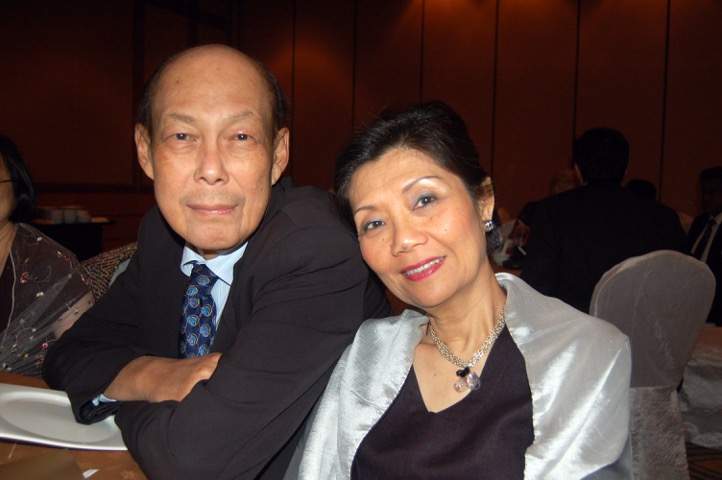
Ong Ai Boon (right), director of The Association of Banks in Singapore, with her late husband, Hock Chye. All photos courtesy of Ong Ai Boon.
Ong Ai Boon is an institution at The Association of Banks in Singapore (ABS), having headed the organisation for the last 40 years.
At 74, she is still its director, leading the association to represent the interests of over 150 local and foreign banks in the financial industry, as well as working with regulators to establish a sound banking structure for Singapore.
Her petite frame belies a voice with the kind of authority that commands attention even in the male-dominated sector.
“I suffered no fools, I was arrogant, self-righteous and hot-tempered.”
Over the years, she and her team at ABS, with the support of its Council, have been working closely with the subject matter experts from the banking industry as well as banking regulator MAS (Monetary Authority of Singapore).
Through this public-private sector collaboration, they have had several notable achievements in their bag, including setting up the Credit Bureau of Singapore and the ubiquitous epayment service, PayNow.
With her lobbying, certain policies such as having the supplementary card holder liable for the debts of the principal credit card holder were also amended.
Her temperament and personality may have afforded her the commanding presence needed for leadership in the corporate world, yet it was also a double-edged sword.
Her husband almost walked out on her and the family.
Not many people know that both her professional and personal life took a toll from what a friend labelled as her “peremptory” nature – one who issues instructions brusquely, expecting to be obeyed immediately with no questions asked.
“I suffered no fools, unable to understand why others could not do something if I could. I was arrogant, self-righteous and hot-tempered,” said Ong.
The ultimate rejection
One year after she was appointed director of ABS in 1982, her husband issued her an ultimatum.
She was then 36 years old and had all the trappings of a good life: A landed home, three cars, good investments, club memberships, a helper and driver, and three children.
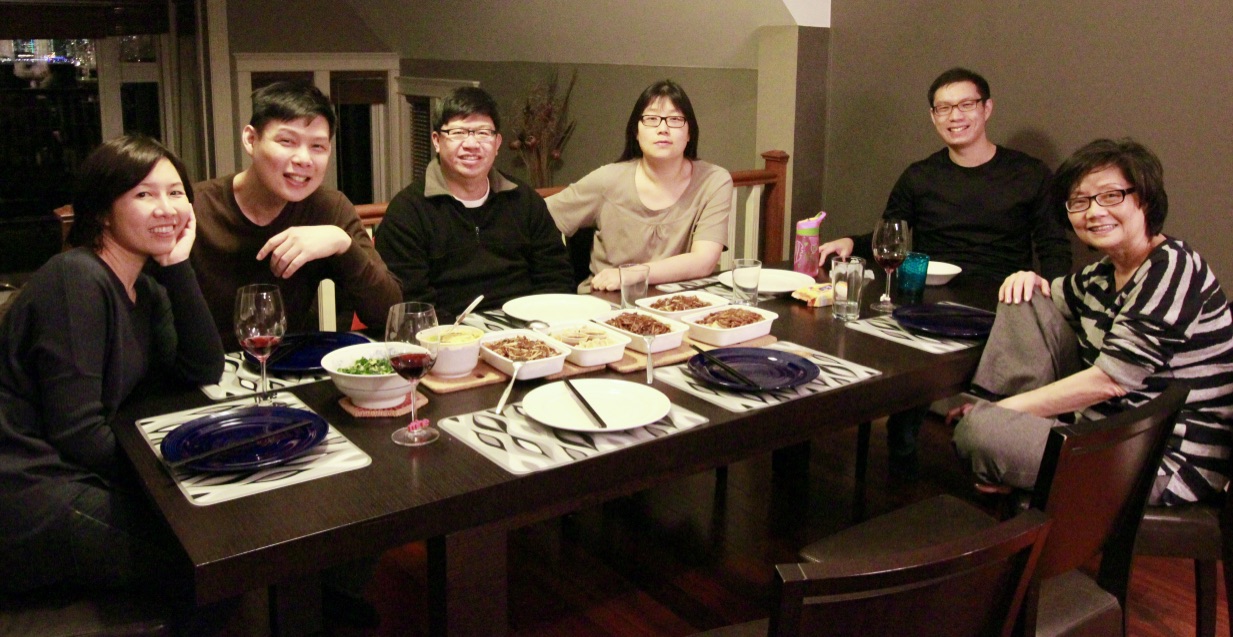
Ong at a family gathering in Vancouver in 2013.
But for some reason, she was not happy, she recalled. She was an angry and quick-tempered person who frequently took out her unhappiness on people around her. When arguments arose, she insisted that her opinion and her way was always right, even during interactions with her bosses. She had the final say and her gentle giant of a husband had no chance of standing up to her.
He was the opposite of her – quiet, long-suffering, often bottling things up internally, until one day his calm exterior cracked.
“Though I put up a tough exterior, I was struggling with low self-esteem, insecurity and self-condemnation.”
In the middle of a day in 1983, he walked up to her and said: “I can’t live with you anymore. If things don’t change, let’s separate. You can take the house and we go our own way.”
For once in a very long time, Ong had no words.
She did not expect it, but she was not surprised at his proposal to separate either.
“I knew I was at fault and, by then, I was already trying to seek help for myself,” she said soberly.
At the time she had turned to various management theories and gurus to try and fix herself.
On her office desk, for instance, were cue cards laid out all over as reminders: “Don’t shout”, “Stay calm”, “Stay cool”.
She also sought out various faiths and philosophies to assuage the emptiness she felt within her and to try to find the meaning of life.
“God knew how to break me. If my husband had left then, I would have gone mad.”
Since young, she has been a spiritual person. Friends would come to her to have their palms read or to check the fengshui of a house as her intuition often led her to make uncannily astute assessments. She dabbled in occult practices such as consulting astrologers and fortune tellers.
“Turning to all these did not give me the meaning or peace that I needed. Though I put up a tough exterior, I was struggling with low self-esteem, insecurity and self-condemnation,” she confessed.
She recalled an incident at work when her secretary went for an operation and she had to find a replacement. To her dismay, she learnt that the assigned staff member did not want to work with her because of her reputation of being quick-tempered.
Ong felt a huge sense of rejection and took leave that day. She went home and wept in her room. As she cried, a song titled “I’ll Never Let Go of Your Hand” happened to be playing in the background.
She was ministered by its lyrics: “Embarrassed by your weaknesses … No matter what may happen, child/ I’ll never let go of your hand/ I know you’ve been forsaken/By all you’ve known before/When you’ve failed their expectations/ They frown and close the door.”
“It was as though God entered my bedroom and healed me of all rejection that I felt,” said Ong.
“This ultimate rejection from my own husband was necessary for me to be broken in.”
Ong was not a believer then but had been exposed to Christianity in her younger days in school.
Aware that she was not well-received at work and at home, rejection was a major sore point for her.
So her husband’s proposal for separation was, to her, the ultimate rejection.
“God knew how to break me. If he had left then, I would have gone mad,” Ong admitted.
“People would refer to me as bui si gai (‘cannot die’ in Teochew). This ultimate rejection from my own husband was necessary for me to be broken in, so I became contrite. It takes different experiences for each of us to reach that place of brokenness.”
Desperate for answers on how to work on herself and find meaning to life, Ong went down the rabbit hole in search for them. But no management guru nor talisman worked.
Instead, a series of events that unfolded unexpectedly provided the answers she was seeking.
Three dreams
A close friend of hers, the late renowned Singaporean architect, Timothy Seow, one of the pioneers of the “bungalows in the air” design concept, came down with a debilitating liver disease.
In the past, their group of friends would take turns to host parties. Eating, drinking and merrymaking was often the order of the day.
Despite initially languishing from the disease, Seow later received the healing touch of God and was miraculously and completely healed. He came away from the experience talking non-stop about God and bubbling over with joy.
Under his influence, their group of friends, including Ong, began gathering at his house for cell meetings instead of raucous partying.
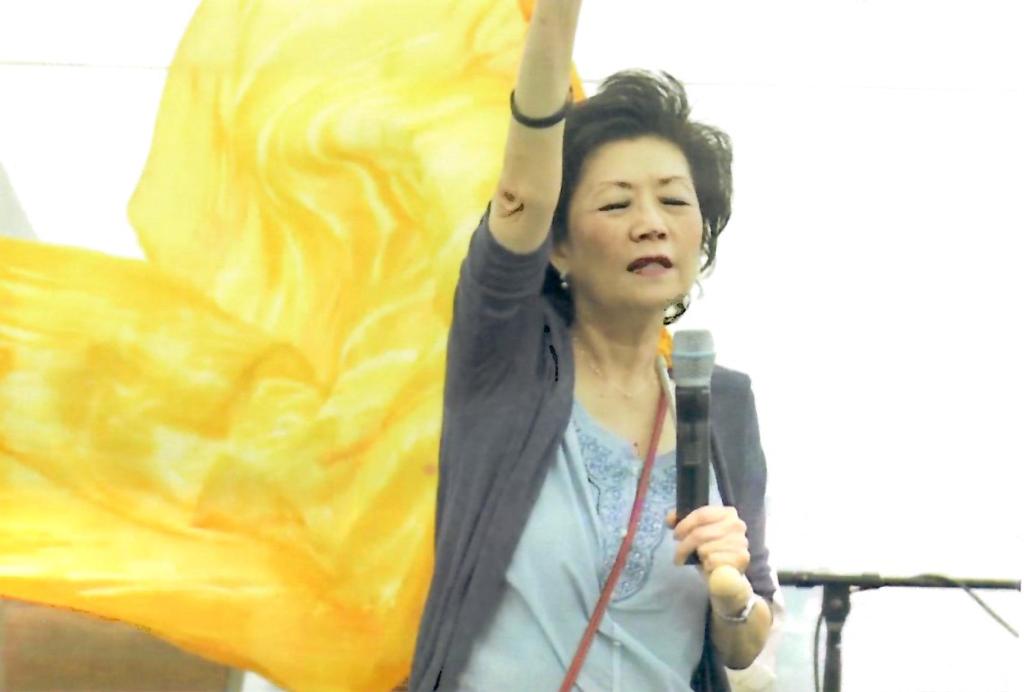
Praying for Singapore and the nations with a prayer group atop a building.
At that time, Ong was also troubled by certain recurring dreams she was having.
As a young girl of about 10 or 11 years old, Ong recalled dreaming of an 8-foot-tall pillar of light.
Puzzled as to what it meant, she asked her aunt, who told her she could have met Jesus Christ in her dreams as He is known to be the “light of the world”.
“Is Jesus calling me?” Ong wondered. In her heart, she knew Jesus was the light.
Ong was skeptical and presumed her aunt’s reply had to do with her being a Christian. She put the matter aside.
In 1983, when Ong, then 36 years old, was facing marital and work troubles and could not find any solutions for her woes, she dreamt that she was in a boat and surrounded by a sea filled with demons.
Distressed, she called out the name of an idol and it appeared. Even as the idol appeared on the seas, the same light that she saw in her childhood dream also materialised.
“Is Jesus calling me?” Ong wondered. In her heart, she knew Jesus was the light.
After Seow’s miraculous healing, Ong had another dream of her enjoying a party in her grandfather’s two-acre bungalow when a fire broke out. Next to the house was a river and she and others jumped into a boat. She wanted to row the people to safety but, again, the sea of demons showed up.
She called out to the idol that she was familiar with and it appeared. Simultaneously, the filament of light that she had seen before in her dreams also came into sight and she woke up involuntarily singing a hymn that she had heard from her school days.
“As I repented … I felt the peace that the world could not give me.”
Shortly afterwards, while at a home meeting at Seow’s house, she heard a pastor preaching from John 15 about how unfruitful branches would be cut away and thrown into the fire.
“I was afraid because I connected that to my three dreams and realised that, if I still resisted God, that would be the outcome,” said Ong.
Feeling convicted, she attended a service at Trinity Christian Centre that week. The preacher was Pastor Naomi Dowdy and she talked about Man’s folly in consulting astrologers and adhering to superstitions when it is God who created the stars and moon that astrologers get their readings from.
“I felt that God was talking directly to me. I saw a vision of gold showers coming down on me and heard the chains of the occult loudly breaking within me,” said Ong.
At the following home cell meeting on October 23, 1983, Ong asked the leader all the remaining questions she had about the Christian faith. When he could answer all of them meaningfully, she gave her life over to the Lord.
“As I repented, the same filament of light that I had seen in my three dreams appeared and entered me. I felt the peace that the world could not give me.”
God, don’t let go
Change for Ong did not come overnight.
What helped her was being aware of her emotions and writing them down in her journal.
Through the years, God gently taught her how to be temperate and cultivate the fruit of the Spirit.
In the past, she also had the habit of expressing herself in her journal, though that took on a different tone of self-condemnation.
“I would write about how I shouldn’t have said this or done that and told myself to stop it. But now I mark those sections with a cross and surrender it to Him. Instead of taking it out on people, I talk to God and write it down. I have a cupboard full of journals,” said Ong.
Though she feared God and sought to obey Him, she was also not afraid of being brutally honest with Him.
There was a time when she felt so sinful that she pleaded for God to help her enter the narrow gate and walk on the narrow path of life.
“I put my hand into Your hand, don’t let go of me. If I don’t and I go to hell, it’s Your fault,” exclaimed Ong to God in one of her many frank prayers to Him.
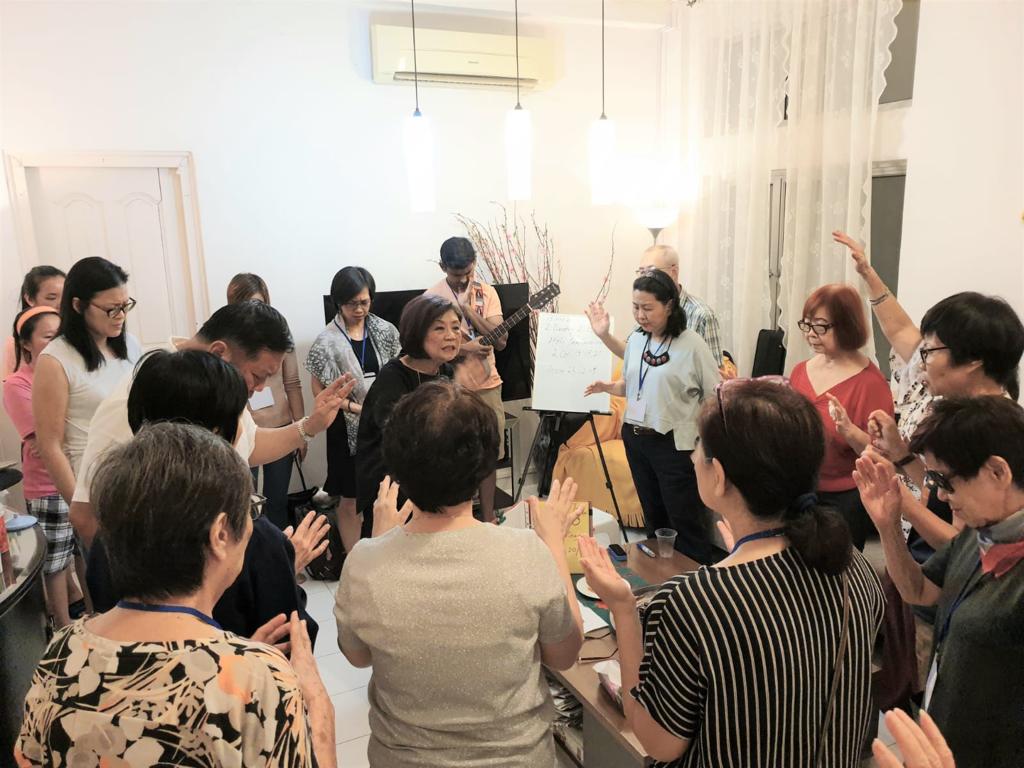
Prayer time at Ong’s church, City Missions Church, where she is an elder.
During a particularly intense conversational prayer session, she got so angry with God that she took a wet towel and threw it in the air at Him.
“I didn’t find that strange because He is so real to me when I talk to Him. Don’t worry, He can take it and handle us,” said Ong wryly.
Through the years, God gently taught her how to be temperate and cultivate the fruit of the Spirit.
He used how she treated “the least” in her household to mould her.
“The Lord called me a fool, one who ‘finds no pleasure in understanding but delight in airing their own opinions’.”
For instance, Ong recalled having a domestic worker who was particularly clumsy and slow when doing the housework. She would drip coffee all over the floor when carrying the cups out; the food she cooked was also substandard.
One day, the helper made an extremely silly mistake and Ong raced down the stairs, ready to “mash her into pulp”.
“When I was running down the stairs, I heard a voice saying to me, ‘Whatever you did for one of the least of these brothers and sisters of mine, you did for me.’ I stopped in my tracks as I was immediately chastened,” said Ong.
Knowing that her helper loves chicken wings, Ong learnt to show love to her by offering her chicken wings before offering them to her children. When her helper eventually became a believer, Ong also taught her to pray before she cooks.
When Ong discovered that another of her helpers was moonlighting, she immediately intended to send her home. But God reminded her: “Let any one of you who is without sin be the first to throw a stone at her.” (John 8:7)
So instead of sending her home, Ong decided to counsel her.
She realised that such acts of daily “dying to self” was the path God wanted her to take, instead of her simply attending meetings or conferences.
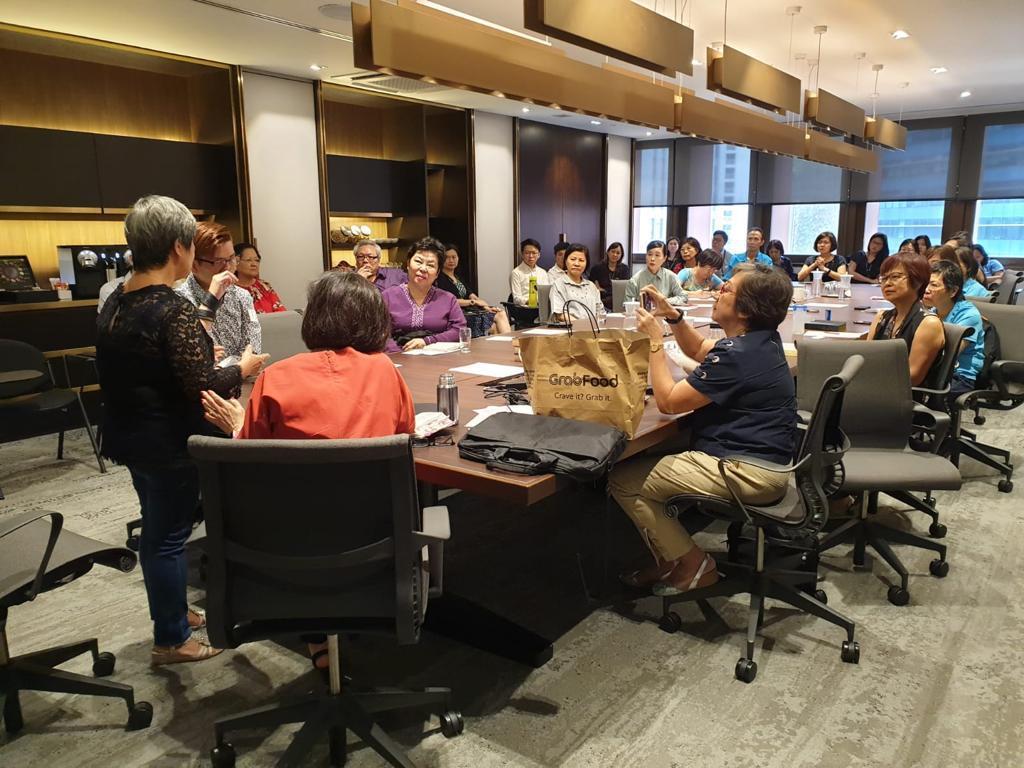
A session at the Monday Lunchtime Fellowship.
“When I was a new believer, I was making my way to a Christian conference when God told me not to go for it. The verse about ‘knowledges puffs up while love builds up’ came to mind (1 Corinthians 8:1),” said Ong.
“I needed to take in knowledge but that cannot be all that I know. So, I decided to have fellowship meetings in my home and office where we would share examples of how we deny ourselves to follow Christ.”
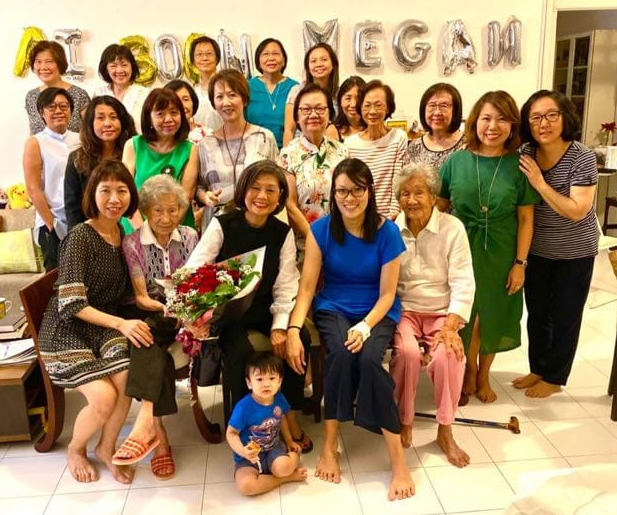
Ong’s birthday celebration at the Thursday Ladies Fellowship in 2019.
Every Monday, she would host a meeting at her office where colleagues from her workplace and employees from neighbouring companies would gather for fellowship. Every Thursday, she would hold another for friends at home. This has been going on weekly for the last three or four decades.
At the fellowship meetings, she would be willing to be vulnerable and share with others how God taught her to be a better woman and a better wife.
A hundred roses
One of the verses that is close to her heart is 1 Peter 3:4, which speaks of “the hidden person of the heart” and the “incorruptible beauty of a gentle and quiet spirit”, simply because it is the opposite of her natural personality.
She had found it difficult to submit to her husband as, most of the time, she believed that she was in the right.
“If he goes, I will die of regret. Let me repent and serve him for all the years he suffered under me.”
“The Lord called me a fool as mentioned in Proverbs 18:2, one who ‘finds no pleasure in understanding but delight in airing their own opinions’. I realised that I needed to obey God and submit to my husband, regardless of how I felt,” said Ong.
She was so adamant in doing right by him that, when he suffered a heart attack in 1996, she went down on her knees in hospital to plead with God for his life.
“You can’t take him home,” she cried out. “If he goes, I will die of regret. Let me repent and serve him for all the years he suffered under me.”
In the midst of her desperate prayer, she saw a vision. It was like a movie playback where she saw scenes of all the ways she had wronged her husband.
God did not take him home that night. Later, a visiting prophet, whom they did not know, released a word to her husband: “You are alive today because of the prayers of your wife.” The prophet had not known what had transpired between the couple in the past.
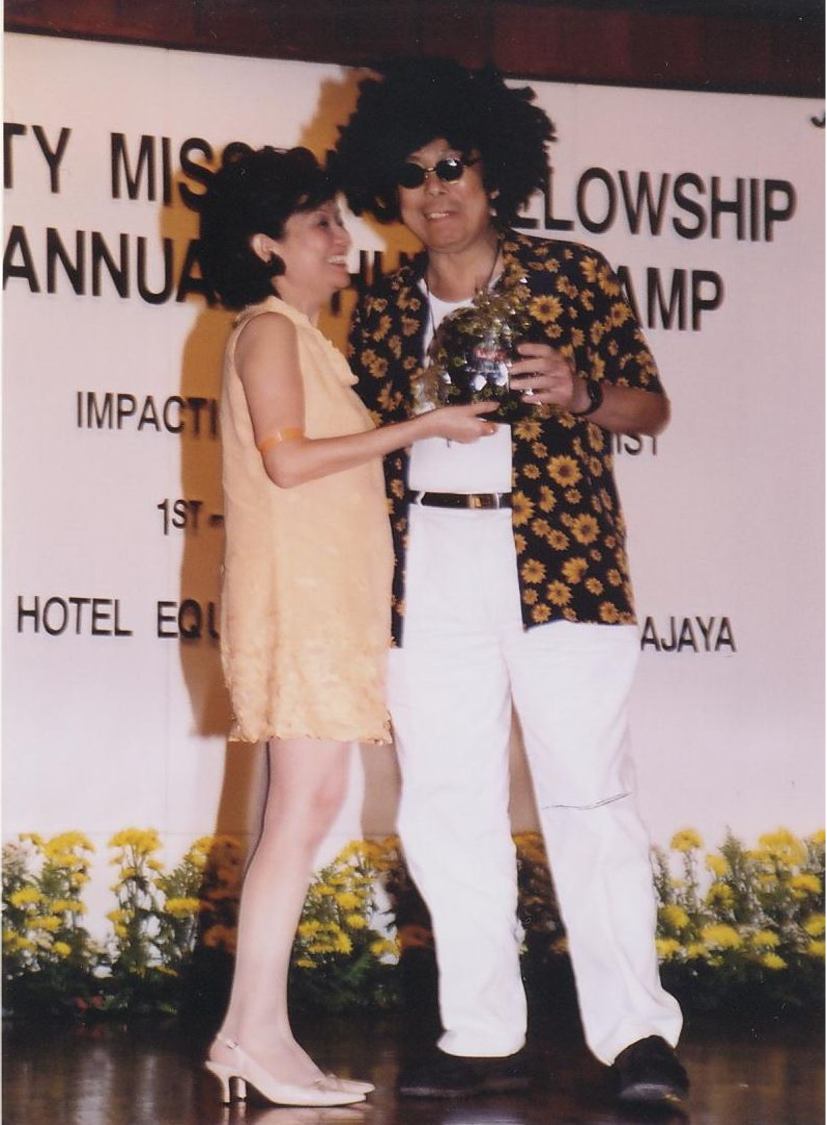
Ong and her husband at a “Back to the 70’s” themed party organised by her church in 2004.
Ong had 10 more years to make amends to her husband before he died in 2006.
On her 58th birthday, her husband gave her a hundred red roses, with a card that read: Totally in love with you.
Ong smiled and said to him: “It is not me you are in love with, it’s Christ in me that you are in love with.”
Over time, God had softened Ong’s angry heart. She became less critical and more caring towards her husband as well as to others around her.
I hate you, Mum
Though she mended her relationship with her husband, Ong struggled with her relationship with her mother.
Her mother was a gentle Teochew lady who had rejected Ong because of her temper.
“Why can’t you be more like me?” her mother often asked her.
Ong resented her mother for the rejection.
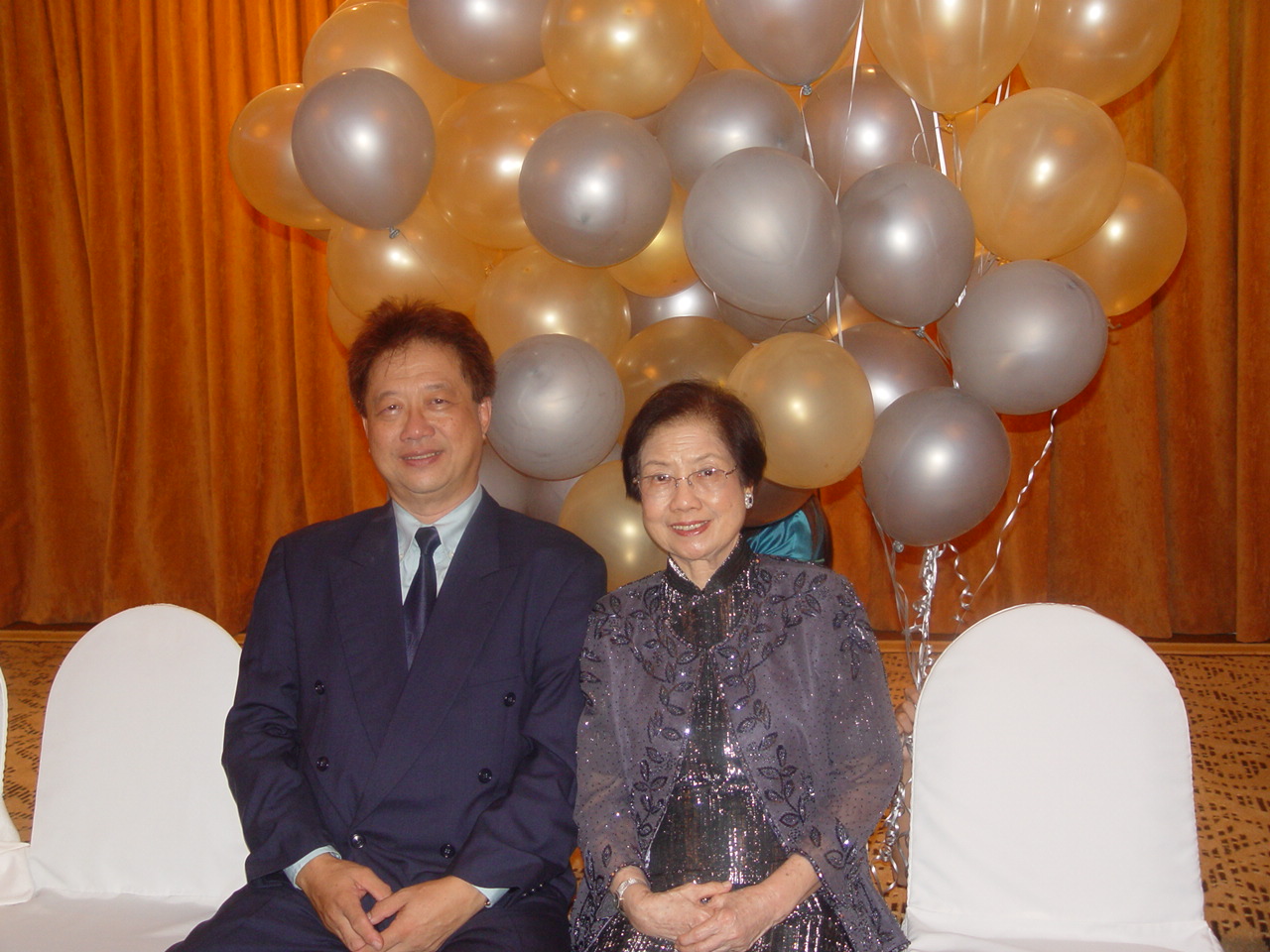
Ong’s older brother, Robert, and their mother.
She knew God wanted her to forgive her mother one day. But she did not know how.
In the later years of her mother’s life, she had cancer, and Ong did not even want to go to the hospital to visit her.
“I love her, but from afar. I couldn’t bear the thought of going. Fortunately, I came down with a bad flu and so I couldn’t visit. I talked to her over the phone instead,” said Ong, who afterwards tried to make amends by inviting her mother to stay with her after the hospitalisation.
Whenever they stayed together, friction between the two inevitably arose after three or four days, and her mother would pack up and go home. As a form of apology, Ong would send a fruit basket to her mum’s place. As Ong tried to die to her old self, this cycle of having her mum stay over and then needing to send her a fruit basket repeated itself.
But, over the years, her mother noticed her daughter’s transformation. This convinced her to eventually become a believer herself.
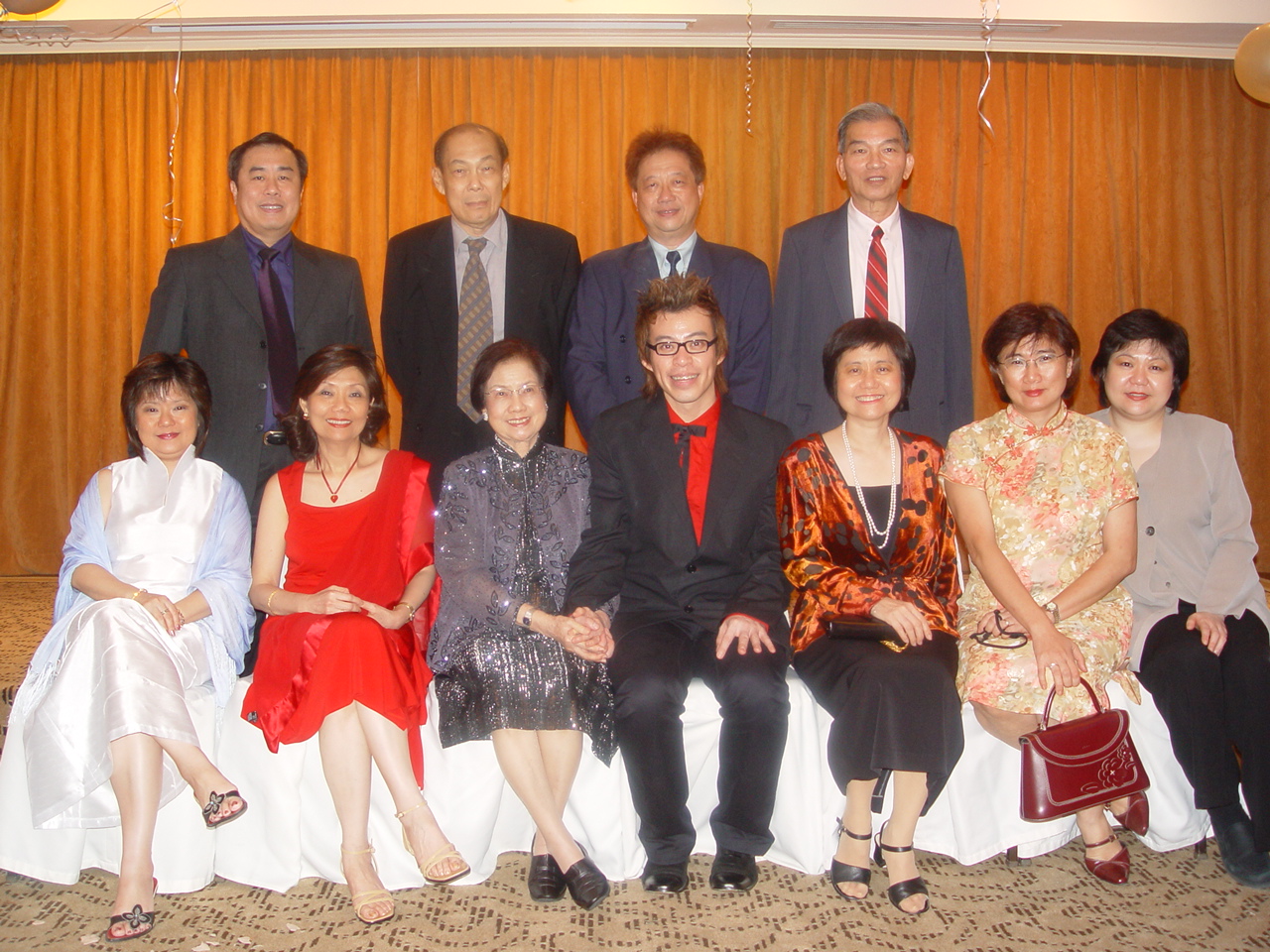
The 80th birthday celebration of Ong’s mother, Sim Soo Sim, in 2004, in a celebration together with Ong’s siblings, their spouses and Mdm Sim’s godson, former Love 972 DJ Dongfang Billy.
But Ong needed one final breakthrough.
Her mother stopped wishing Ong would be like her. Instead, she told her daughter: “I wish I could be more like you.”
It came when she watched the movie, Pretty Woman. In one scene, actor Richard Gere paid a psychiatrist $1 million to help him to get his life back in order. During the therapy session, the psychiatrist instructed him to express his feelings towards his father and Gere blurted out: “I hate you, Dad.” That honesty ironically allowed him to go on to love his father again.
Ong followed suit and told her mum face to face: “I hate you, Mum.”
Her mum exclaimed: “Oh my gosh.”
All of Ong’s feelings of rejection, resentment, guilt and disappointment were validated in that exchange. At that moment, Ong knew she was set free to love her mother again.
Upon the death of her husband, she took her mother in to live with her before her mother passed on in 2019.
In those years, her mother stopped wishing Ong would be like her.
Instead, she told her daughter: “I wish I could be more like you – having the fear of God and being quick to obey Him.”
Grace, joy and passion at last
Even at 74 , Ong continues to live a full life.
Her success at work lies in her ability to bring people with diverse expertise to work together for the financial good of the country, an irony given that her relationships with others used to be her Achilles heel.
Apart from leading ABS and her two weekly fellowships, Ong also serves in the Esther ministry at City Missions Church, where she is an elder.
The Esther ministry, held on Friday evenings, helps women learn to hear from God and obey His Word, so that they may have wisdom like Esther when she chose not beautify herself to meet the king but to listen to the king’s eunuch instead.
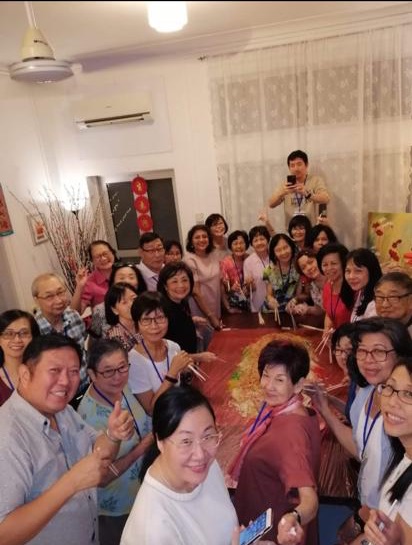
City Missions Church Esther Ministry having its CNY celebrations in 2019.
People often stop Ong and ask her how she gets the energy to stay on top of so many things.
“I tell them that, when they stay in and do the will of God, they will have the grace, joy and passion to do all that they want to do, just like Caleb in the Bible who was 85 going on 40,” said Ong with a chuckle.
Life continues to assail her with its inherent pains and trials.
As a result of her past, she still lives with the pain of being estranged from one of her children.
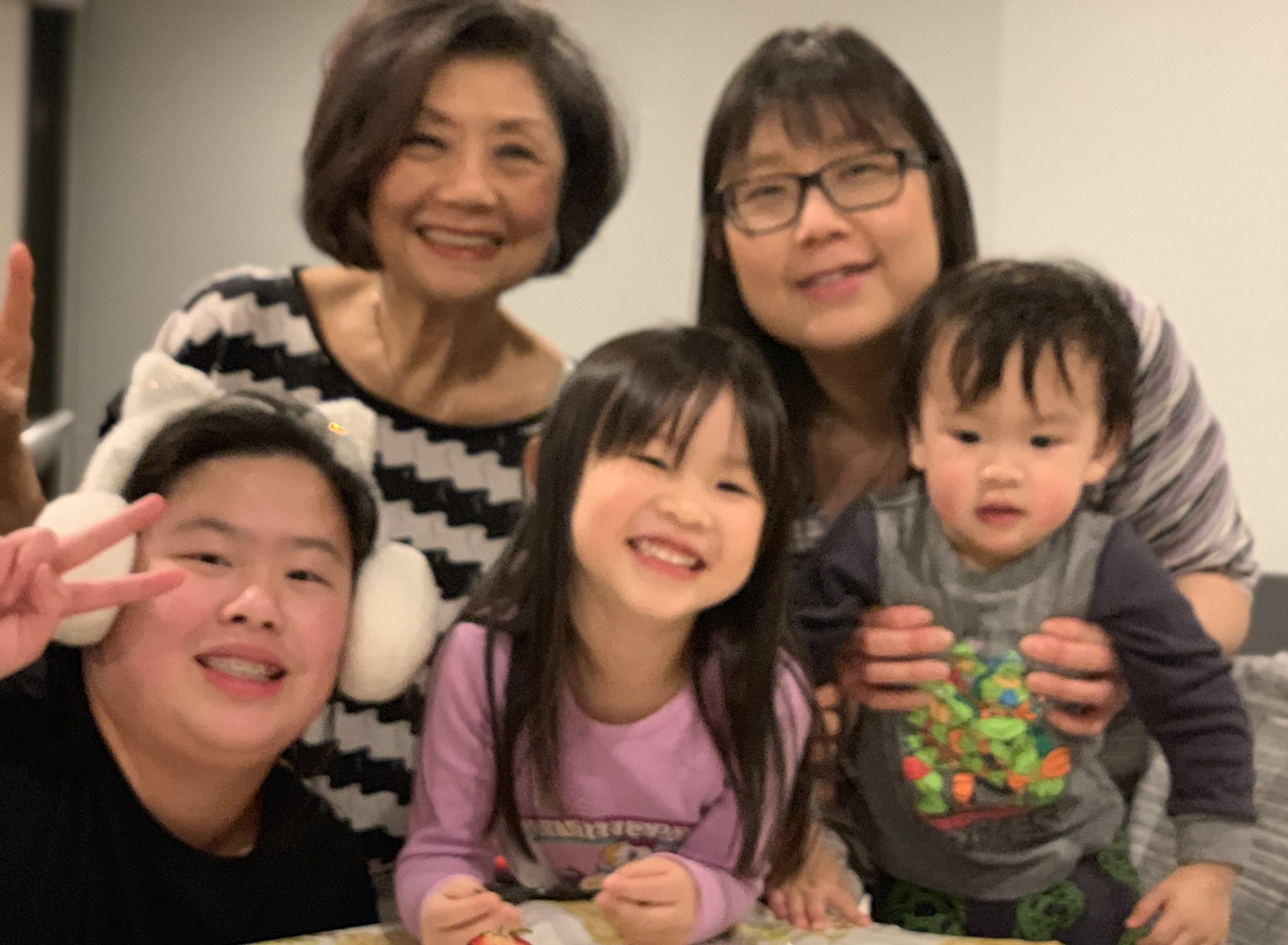
Ong with her daughter and three grandchildren in Sydney in 2019.
Last year, her daughter-in-law, a former doctor who specialised in voice disorders, was diagnosed with Motor Neurone Disease (MND), an uncommon condition that affects the brain and nerves. It causes weakness that gets worse over time.
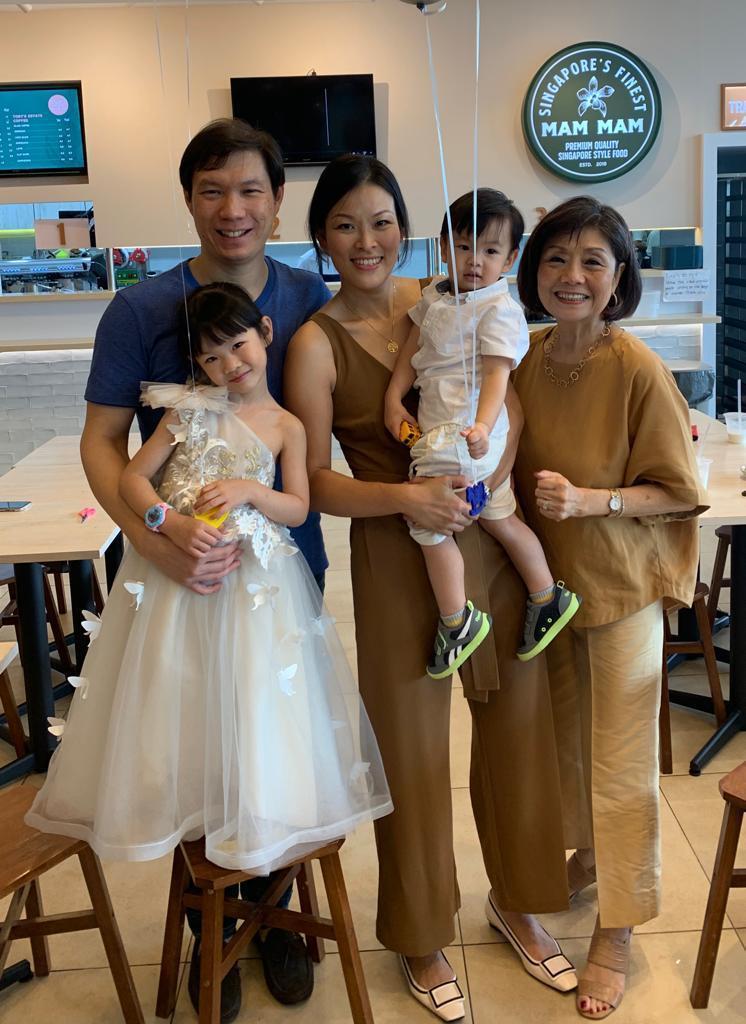
Ong with her son Tze Ru, daughter-in-law, Jing Yin, and grandchildren Megan, 5, and Matthew, 3.
Ong stands in the gap to intercede for her, choosing to claim God’s promises and not to give in to fears.
“Fears can easily set in when I see her physically get weaker by the day. But I stand on God’s promises in Hebrews 10:35-36 to persevere to do His will and receive what He has promised,” said Ong.
“From His track record in my life, He has never failed me.”
IF YOU LIKED THIS STORY, READ:
“We were meant to be here”: SARS doctor who arrived in Singapore just before the outbreak
We are an independent, non-profit organisation that relies on the generosity of our readers, such as yourself, to continue serving the kingdom. Every dollar donated goes directly back into our editorial coverage.
Would you consider partnering with us in our kingdom work by supporting us financially, either as a one-off donation, or a recurring pledge?
Support Salt&Light


